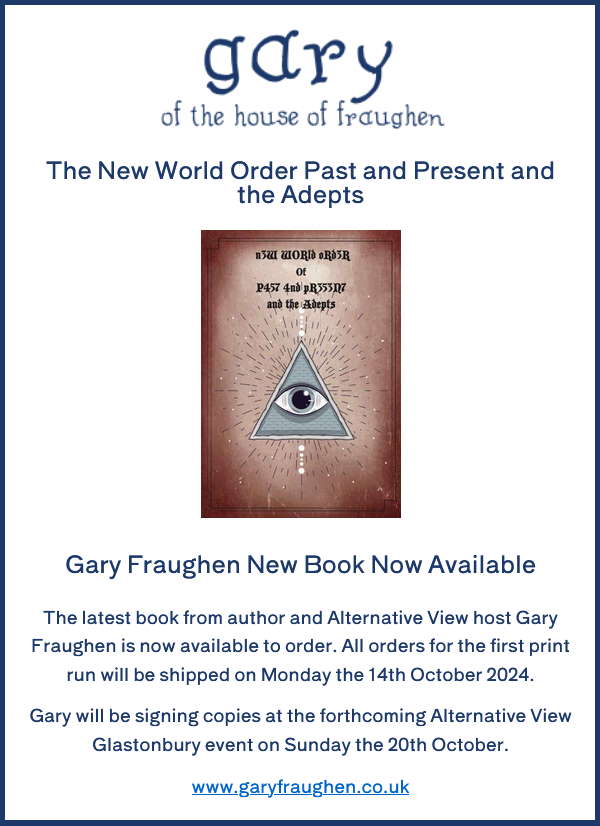BRICS Play Many Tunes; West Marches To One
Thu 11:19 am +01:00, 24 Oct 2024- The Western media’s effort to diminish BRICS masks fear at home
- Europe’s largest manufacturer sees “no point” in investing in Germany
- Britain shuts last coal power station, biggest steel mill & Titanic shipyard
- BRICS is globalist, but that does not mean there is only one path
- Facing same technology and industrial challenges, the moral purpose is different
- West does not understand BRICS, seeing everything through the eyes of conflict
Thoughts on the BRICS – the summit in Kazan, Tatarstan, Russia, led by Russia, India, China and South Africa – with Brazil’s leader absent…
See also:
BRICS Answer To War On Resources – Replacing conflict as the means to support the dominant currency (Oct 13, 2024)
(1,900 words or under 10 minutes of your company.)
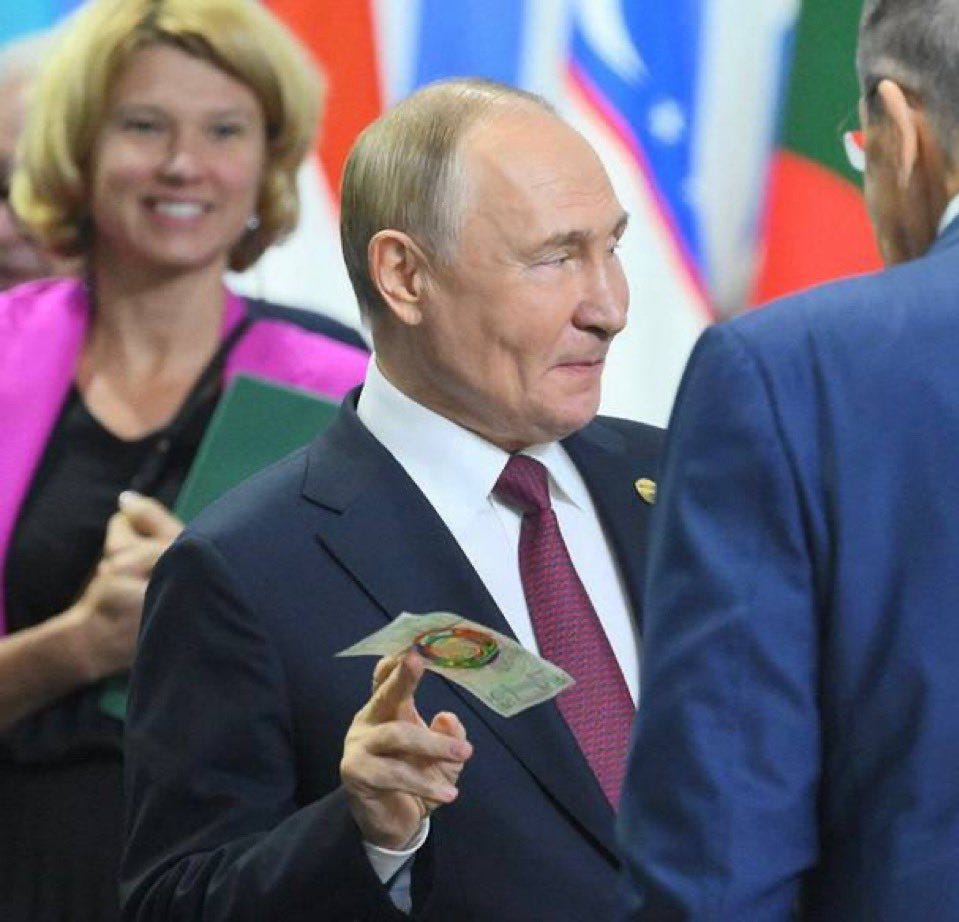
Oct 24, 2024
People get agitated about BRICS: Russia, India and China are attacking the dollar, presuming to challenge Western hegemony. Or is it a sneaky dialectic — another way to centralise currency and control?
Others get excited about the prospect of gold-backed money, something to stash with their Bitcoin.
Straw man arguments — such as BRICS can’t replace the dollar or challenge NATO — miss the point: BRICS is much more low-key.
If you want to hear an economy scream look at England (outside London) or what America’s elite calls flyover country. Visit what’s left of North Carolina or Detroit, Michigan.
Western countries are de-industrialising. The locus of production has shifted, while countries from South America and Africa to Asia are trying to keep a bigger share of the revenues from their own produce.
Can they add value by processing and manufacturing at home, rather than selling raw materials to be traded in London and Chicago? The Western financial insitutions, especially the International Monetary Fund, wrest control from the global south and to maintain the colonial triangular trade.
You’ve got to have something to trade. Money is simply the means of transaction.
The BRICS are able to discuss a new settlement system because they are rich in resources: Saudi Arabia and the UAE, as well as Iran and Russia, are major producers and exporters of oil and gas.
What came out of Kazan?
President Xi Jinping said Russia and China would develop special economic zones, and cooperate on deep sea research.
China’s biggest news was not part of the BRICS agenda; the agreement with India to set aside their long-running border disputes.
Xi spoke of the unnerving global situation and quoted a saying: “The bigger the wave and the tide, the more we must stand firm.”
Russia and Iran are planning a “comprehensive strategic partnership agreement” but although presidents Vladimir Putin and Masoud Pezeshkian met in Kazan, it’s still not clear it’s been signed.
Venezuela is ready to offer BRICS+ countries a package of projects and opportunities in the oil sector, said president Nicolas Maduro.
There was no revelation of a new currency, although someone did hand Putin a mock-up of a BRICS note — to the chagrin of the governor of the Central Bank of Russia Elvira Nabiullina.
Selling schadenfreude
The Western media’s effort to diminish BRICS masks a growing concern at home.
Europe’s self-inflicted energy crisis is accelerating. A top Siemens executive says investments in Germany are pointless.
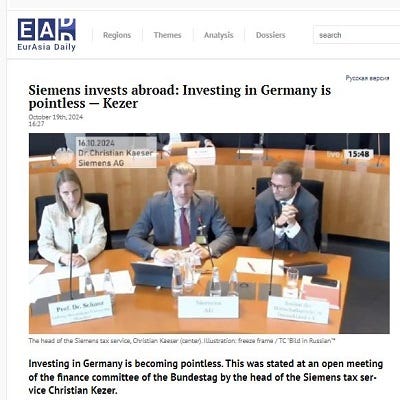
“There’s actually nothing that speaks in favour of investing in Germany,” Christian Kaeser, global head of tax at Siemens told lawmakers in Berlin last week.
Siemens wants to invest “but there’s no growth in Germany — there is growth in other countries — and the tax situation isn’t particularly good either,” he said. “That’s why our most recent investments primarily were made abroad.” [1]
This is huge. Siemens is the largest industrial manufacturing company in Europe: rail and transportation, energy generation and storage, medical devices, telecommunications.
Europe’s implosion
The destruction of the Nord Stream gas pipeline, by Germany’s supposed allies, created an energy shortage that has driven companies like chemicals giant BASF to move operations abroad. Volkswagen is to thinking about closing one of its plants, Osnabrück, and may expand its U.S. operation at Chattanooga, Tennessee.
See Eurasia note #63 – Europe Reels From Germany’s Impending Decline – New south-north axis for energy and political influence could reshape continent (Oct 29, 2022)
German Voters Reject Political Squatters – ‘Centrist’ parties defy popular fury, cling to power (Sep 03, 2024)
Since Nord Stream’s detonation in September 2022, Germany’s economy has contracted for two years consecutive years — and the decline is accelerating.
Barista Britain has already de-industrialised. Here are the headlines from one month, September 2024:
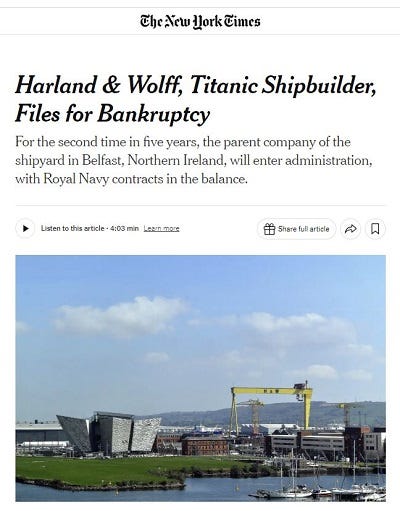

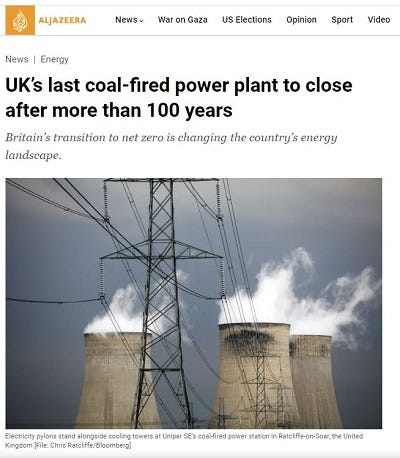
The shipbuilder Harland & Wolff in Belfast, Northern Ireland, famous for the Titanic, is insolvent. The last steelworks in Wales at Port Talbot has closed, as has the last coal-fired power plant to in Ratcliffe-on-Soar, Nottingham, England.
It’s also demolishing the power plants so that they cannot be re-started in an emergency.
Here’s the flowery language in which the BBC seemingly delighted at de-growth:
“The last iron to be produced at Port Talbot has been tapped. Plumes of white steam could be seen being vented from the furnace for the last time just after 17:00, signalling the end of traditional steel making in Wales.”
War on cash
Even cash adds value. Digital money is more convenient, or so we are told — though many economic studies suggest cash leads to higher economic activity. Watch for that newsletter, coming soon.
Yet the war on cash continues. Israel is the latest to propose abolishing relatively low-value notes: the 200 shekel bank note (just over $50) as a first step to restrict and eventually eliminate cash.
In 2016 India’s prime minister Narendra Modi withdrew all 500-rupee and 1,000-rupee notes “demonetizing” 86 per cent of the country’s circulating cash, leading to an economic crisis (he later reversed the decision).
The sudden move caught even the finance minister by surprise, suggesting it was not Modi’s idea but rather an experiment by the globalist banker class on the world’s largest population. About 15 million workers dropped out of the labour force, poor households saw a decline in consumption, growth dipped to its lowest in three years and tax revenues fell.
I mention this to confirm that, yes indeed, the BRICS countries participate in the globalist agenda. This is one world subject to the same forces. Everyone is experimenting with the same technologies. But technology has no logic. Morality determines what you do with it.
If you claim all the leaders are united in using technology for the same aim, however, you must be able to tell me not just what technology, but what is the moral purpose that drives it.
Don’t say “they’re on the same team” unless you can tell me what is that team and who is the manager.
Born of crisis
BRICS began as marketing strategy by Goldman Sachs to sell emerging markets to investors in the early 2000s. That blew up in 2008 when a financial crash on Wall Street led investors to yank their money out of developing countries to settle debts back in Europe and the U.S..
The 2008 financial crash showed how exposed emerging market economies are to the sudden withdrawal of USD in the event of a crisis in the U.S..
When the U.S. began using the dollar-based banking system as a tool of foreign policy, by excluding countries like Iran and Russia from the global transaction system SWIFT, they were forced to find an alternative.
Russia was already building a Eurasian Economic Community, borrowing from the Brussels model, but it had few members. It was crisis that gave BRICS momentum.
Eyes of conflict
The West does not understand BRICS. It sees everything through the eyes of conflict and rivalry. This is amplified by media and politicians repeating the same talking points: when you clone politicians, don’t be surprised when they behave like clones.
A reader asks who is top dog in the BRICS. But the BRICS is not the G7, which is associated with the Bretton Woods financial institutions the World Bank and the International Monetary Fund — although BRICS has launched the New Development Bank.
China sees BRICS as a mechanism, not a club with rules. There are no membership requirements. So everyone who joins brings the economic logic of their own industries and resources, and negotiates their own objectives.
There were numerous side meetings at the summit in Kazan, Tatarstan, Russia. For example between the presidents of Iran and UAE, Masoud Pezeshkian and sheikh Mohamed bin Zayed Al Nahyan.
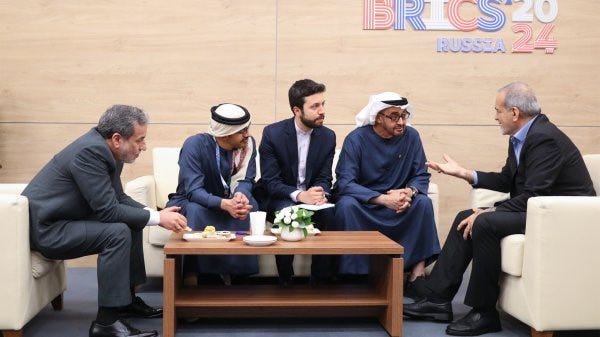
The U.S. put pressure on Argentina to withdraw its application to join BRICS, to which president Javier Milei complied. Brazil’s president Lula da Silva “slipped in his bathroom” and was unable to attend the BRICS summit.
Given that South America is within the Monroe Doctrine’s U.S. backyard, this is not surprising.
Israel was notable by its absence from BRICS. It attended the St Petersberg International Economic Forum in 2018. Israel’s foreign minister Eli Cohen in April visited Azerbaijan and Turkmenistan, marked by the opening of embassies – but with a focus on trade.
Intricate mechanism
If you think of the BRICS as a mechanism not a group, then many other countries could benefit from its potential tools:
- an alternative to the IMF and World Bank and the Anglo-American “rules based international order”
- think a United Nations that is not dominated by the five permanent member sof the Security Council
- the ability to trade without converting your currency into USD, and they back again
- placing trade finance in a process of mutual development and out of the central banker, private equity, vulture capitalist model
The list goes on:
- Countries like Ireland might “free yourself from mental slavery” and the 2010 bank bailout which put future generations on the hook for €85 billion
- The British are on a similar hook for £150 billion
- Germany might escape the second Morgenthau plan which seems to be in process
- The European southern “periphery,” which investment bankers call PIGS (Portugal, Italy, Greece and Spain)
Don’t get me started. The trade winds blew civilisation from North Africa and the Levant to the coasts of Ireland, Wales and Scotland long before it reached Paris or Berlin. See The Atlantean Irish by Bob Quinn (2005), fables of Odin notwithstanding.
Define inclusive
Chinese state television, covering the BRICS, ventured that “inclusive” means something much bigger than the diversity, equity and inclusion (DEI) ideology, and above all co-operation.
Physics has many lessons that dispute centralisation. Gas particles demonstrate that a fine mesh of networks — lots of small pipes — are a more effective dispersal system than a few big tubes. They are less prone to congestion and more resilient because they can’t be shut off as easily as a few big conduits.
Alastair Crooke at Strategic Culture Foundation used an analogy from physics to explain global events. Scientists who study avalanches say it’s not about mass or flow.
Dozens of points of instability develop in a pile. In their model they colour grains red if they are individually oblique to the mass and ready to move. These cusps of change are distributed seemingly randomly, “a dense skeleton of red instability” spreading through the pile. The status quo holds until a grain falls on one of these points and suddenly causes other red spots to slide. [2]
Music of spheres
Rather than chaos, think of the world as a complexity of intricate mechanisms that each serve their purpose and interest, while avoiding obstructions or gridlock.
Engaging with BRICS we should embrace the music of Kazan.
Since I am writing for a troubled Western audience, the best I can offer is the music of Bach, which seems to resolve complication like a mathematical answer, helping to unwind emotion like a vanishing migraine, so that we can see more clearly.
The world does not “sing in perfect harmony” like a Coca-Cola advert. The world does not “live as one” in Lennon’s lyric. It lives as many.
The negotiating logic of Bach is not confined to the German Kapelle where he was”master of the chapel choir” in Leipzig.
Technical observation: what a desipicable act to provide such a desktop microphone for one of the greatest popular-classical musicians of all time. Half way through the song they reduce the levels because it cannot cope with Simone’s range.
Not simply a metaphor but an example of a dissident voice constrained.
Source: https://moneycircus.substack.com/p/brics-play-many-tunes-west-marches



